I am developing a quiz game but i have an existing database file where Question and choices are there.. How could i connect it in my program. And how could, I perform a query to display my Question in TextView and choices in Buttons.
-
1Please [read](http://www.vogella.com/tutorials/AndroidSQLite/article.html) – Glenn Feb 12 '14 at 03:08
-
possible duplicate of [How to ship an Android application with a database?](http://stackoverflow.com/questions/513084/how-to-ship-an-android-application-with-a-database) – Andrew T. Feb 12 '14 at 03:23
-
please post your code or clarify your question then i will help you.. – dipali Feb 12 '14 at 03:46
1 Answers
A step-by-step guide to make a Quiz game:
Step 1:
First make your database from SQLite Manager. Make 1 column of primary index, 2nd column of Questions, & 3rd,4th,5th,6th column for Options . And 1 more column for the same string of correct answer(for comparasion of the correct answer). should like this shown in the image:

Copy paste this filename.sqlite in the assets folder
Step 2:
Make a new Class for Getter Setters for getting and setting the database.It should consists of all the fields that you are trying to fetch.
Step 3:
Make a DBAdapter Class extending SQLiteOpenHelper . Use this code:
public class DBAdapter extends SQLiteOpenHelper
{
static String name = "kbcquiz.sqlite";
static String path = "";
static ArrayList<kbc> a;
static SQLiteDatabase sdb;
@Override
public void onCreate(SQLiteDatabase db)
{
// Your database is already Created, so no need to add anything here
}
@Override
public void onUpgrade(SQLiteDatabase db, int oldVersion, int newVersion)
{
// Database Not upgraded here
}
private DBAdapter(Context v)
{
super(v, name, null, 1);
path = "/data/data/" + v.getApplicationContext().getPackageName() + "/databases";
}
public boolean checkDatabase()
{
SQLiteDatabase db = null;
try
{
db = SQLiteDatabase.openDatabase(path + "/" + name, null, SQLiteDatabase.OPEN_READONLY);
} catch (Exception e)
{
e.printStackTrace();
}
if (db == null)
{
return false;
}
else
{
db.close();
return true;
}
}
public static synchronized DBAdapter getDBAdapter(Context v)
{
return (new DBAdapter(v));
}
public void createDatabase(Context v)
{
this.getReadableDatabase();
try
{
InputStream myInput = v.getAssets().open(name);
// Path to the just created empty db
String outFileName = path +"/"+ name;
// Open the empty db as the output stream
OutputStream myOutput = new FileOutputStream(outFileName);
// transfer bytes from the inputfile to the outputfile
byte[] buffer = new byte[1024];
int length;
while ((length = myInput.read(buffer)) > 0)
{
myOutput.write(buffer, 0, length);
}
// Close the streams
myOutput.flush();
myOutput.close();
myInput.close();
} catch (IOException e)
{
System.out.println(e);
}
}
public void openDatabase()
{
try
{
sdb = SQLiteDatabase.openDatabase(path + "/" + name, null,
SQLiteDatabase.OPEN_READWRITE);
} catch (Exception e)
{
System.out.println(e);
}
}
// Method for fetching Data and storing it into ArrayList
public ArrayList<kbc> getQuestions()
{
//question is the table name, you can also use "SELECT * FROM question" in case
Cursor c1 = sdb.rawQuery("SELECT * FROM question ORDER BY RANDOM()", null);
a = new ArrayList<kbc>();
while (c1.moveToNext())
{
kbc q1 = new kbc(); // kbc is the getter setter class
//the below code can vary upon ur getter-setter methods & variables
q1.setSno(c1.getInt(0));
q1.setQuestion(c1.getString(1));
q1.setA(c1.getString(2));
q1.setB(c1.getString(3));
q1.setC(c1.getString(4));
q1.setD(c1.getString(5));
q1.setAnswer(c1.getString(6));
a.add(q1);//--Always remember to add the fetched elements of type ArrayList<GetterGetter>
}
return a;
}
}
Step 4:
Use this POC in your MainActivity
DBAdapter db = DBAdapter.getDBAdapter(getApplicationContext());
if (!db.checkDatabase())
{
db.createDatabase(getApplicationContext());
}
db.openDatabase();
q = db.getQuestions();
And for getting any string from arraylist use q.get(0).getQuestion(),q.get(0).getA(),q.get(0).getB(),q.get(0).getC(),q.get(0).getD()
Change the indexing to get different colums & set That text to TextView,or Button.
On Click of an choice of an answer you can check the correctness by
if(btn4.getText().toString().equals(q.get(e).getAnswer().toString()))
{
// correct answer
//Use it for changing color,managing indexing, etc..
}
Output:
Hope this helps! Cheers
- 1,936
- 8
- 47
- 77
-
-
@Warde how did you fill this database? for example I have questions but they're in Text. Do you know any easy trick for text to sqlite or Are there any program for doing it automatic? – mehmet May 02 '14 at 07:00
-
You have the questions in text & u can type it in sqlite manager as shown in the 1st picture – Vivek Warde May 04 '14 at 04:16